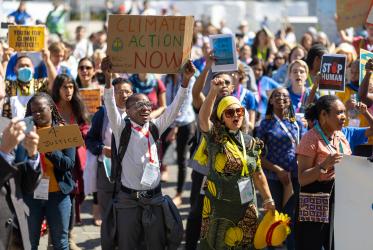When I was first called to integrate the Season of Creation Ecumenical Youth Committee in 2021, I had no idea how far and fruitful this journey would be. The journey has been a mighty river all along, but only this year have I been able to contemplate that.
The Season of Creation Ecumenical Youth Committee started being articulated in 2020, so when I started to participate in June 2021, I was soon invited to represent the youth in the Season of Creation Ecumenical Steering Committee as well, given my eagerness to help. Every month then became to be an opportunity to witness the power of ecumenical solidarity and intergenerational solidarity. I wish the whole world could witness what I see when I participate in the meetings and planning processes for Season of Creation. There are extraordinary Christian people working worldwide for creation care, for climate justice, for love—both at grassroots levels as well as at grasstops. Having been part of this process for two years now, when I see the predictions of doom due the crises we are living, I echo Pope Francis’s words with no shadow of a doubt in my heart: “We know that things can change” (Laudato Si’ n.13)!
As this year’s Season of Creation unravels, I’ve been getting goosebumps seeing the theme and symbol being used all across the world, across denominations, across countries, across cultures. It makes me think of the power of capillary action, just like different streams, creeks, rivers spread across territories help bring life to earth and come together as a mighty river heading out towards the sea. What is especially significant to me is to think about the discernment process that took place at the end of 2022 for deciding on what the theme and symbol for this year would be. In the previous years, the Youth Committee had always been invited to participate in the Season of Creation preparation process by being responsible for the 4 October official closing event online. But this time, by what can only be understood as inspiration from the Holy Spirit, the ecumenical Steering Committee convened a group of youth to lead and generate ideas for the 2023 theme and symbol. The intention was to ground the season’s focus on the perspectives of youth and youth movements.
After a serious and meticulous process of brainstorming and listening sessions, led by Rachel Mander who was a member of the Youth Committee, ecumenical youth from all over the globe recommended that the focus of the theme should be on justice and peace. And the reasons for that were explained.
An explicit focus on justice would fit well with with where we find ourselves currently, waiting for the action that is needed and understanding that the origin of the crises is injustice
A focus on peace would fit well with current world conflicts and the connections with the environment, and has a rich theological opportunity to speak of God's promises of the reconciliation of all things.
With this framework grounding the decision-process for 2023, a smaller group of the Steering Committee met to further refine these ideas and connect them with Scripture. Two proposals resulted from this process, which was then presented to the Season of Creation Advisory Committee for their input during a special meeting. The consensus was to go with the image of the river, but figuring out the actual words for the theme ended up being a task for Rachel Mander and I to work out. And so we had a lovely meeting, as two sisters of faith, she from the Global North, I from the Global South, discussing how the nuances of the words for the theme could influence the impact and widespread of it across the world and translations. Thus, after this beautiful collective effort of the Christian family, the theme for Season of Creation 2023 was decided: “Let justice and peace flow,” inspired by the symbol of “A mighty river.”
This is why every time I feel overwhelmed with the near-apocalyptic news about global warming, heatwaves, floods, droughts, famine, climate refugees, vulnerable species, I cultivate the memory of this process. In Latin America, cultivating memory is a way to celebrate where we are, knowing where we have been and where we are capable of going. And we are in an incredible time indeed—a time in which the Christian family works together like never before for the care of our common home, recognizing and appreciating the gifts that each person, each community, each denomination brings to this urgent task that is to protect the Earth and its future generations.
Each one of us is essential for the mighty river to flow. As persons we are the drops of water in the creeks, the creeks that are our communities that flow into streams, streams that are our denominations which then join together as one mighty river, working for justice and peace making our way to the sea of life in abundance for all of Creation.
I would like to end this witnessing of the mighty river flowing with a special thanks to each of the youth who participated in the brainstorming process for the 2023 Season of Creation theme and symbol: Rachel Mander, Priyanka Gloria Gupta, Noxolo Fihla, Angelo Kurbanali, Analisa Ramsahai, Cecilia Okusi, Bino Makhalanyane.
As well as a special thanks to all the members from the Youth Committee who together represent Anglican, Lutheran, Roman Catholic, Methodist, Evangelical churches coming from Kenya, Congo, Philippines, India, Ethiopia, Kenya, Zambia, Bolivia, Colombia, India, Fiji, Timor-Leste, South Africa, Germany, Brazil, USA.
Praised be our Creator! And may the mighty river of justice and peace flow!






